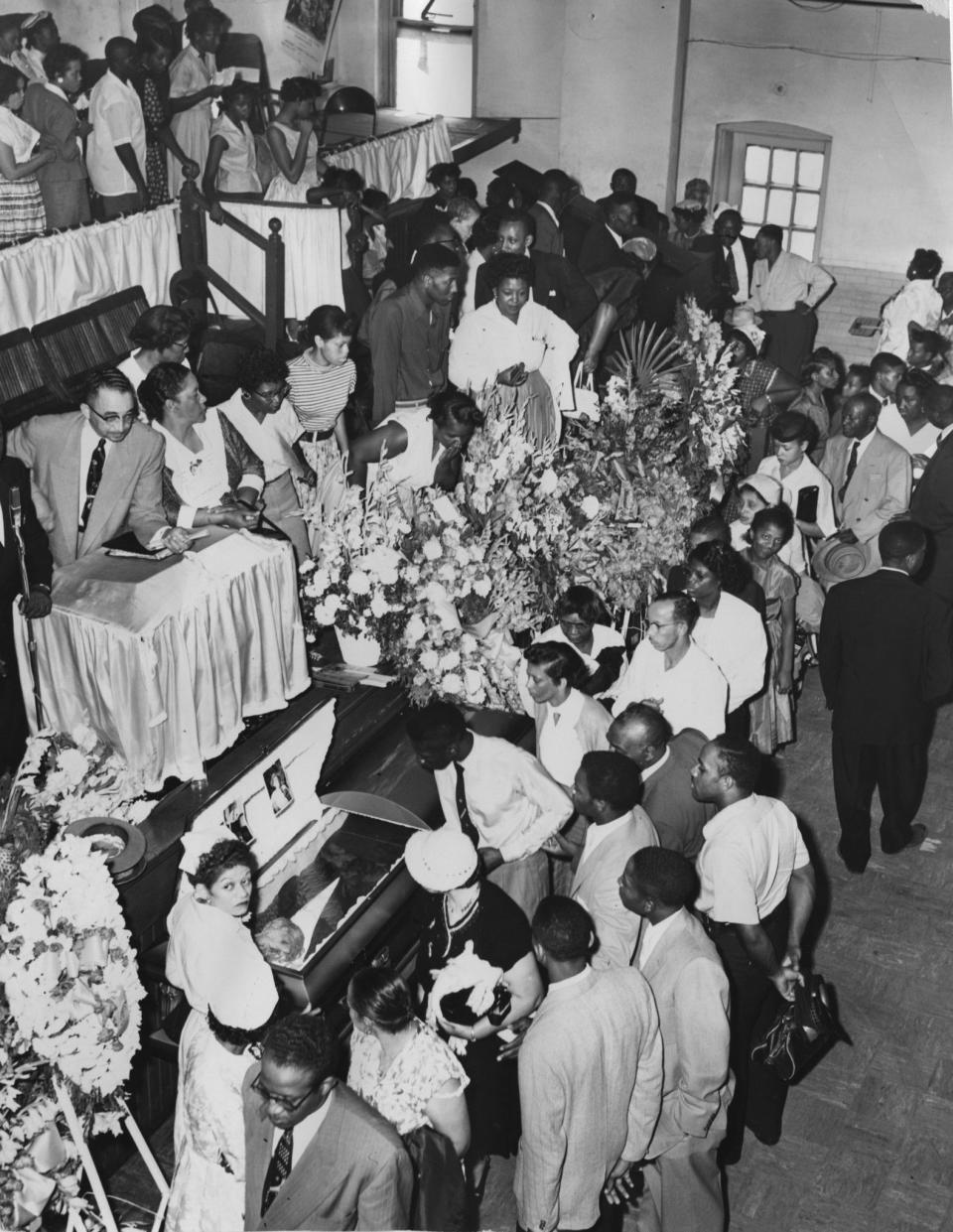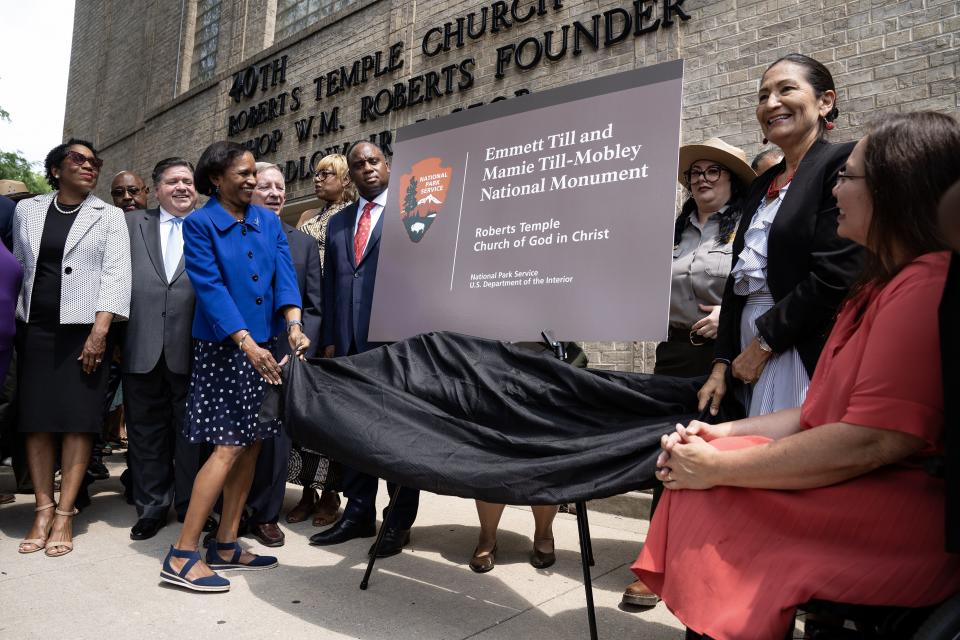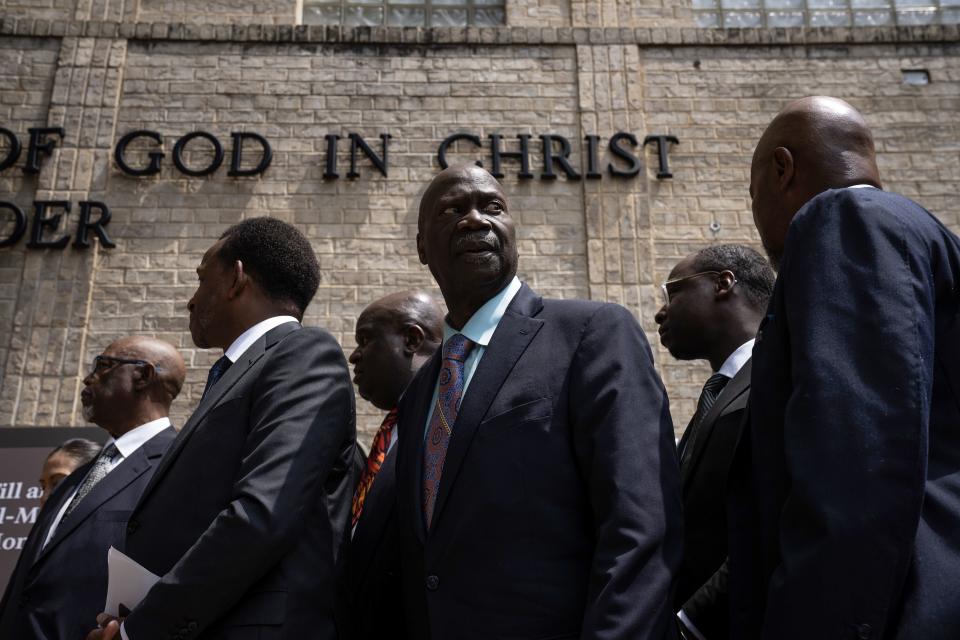Emmett Till signage unveiled at Bronzeville church that’s becoming a national monument
At the South Side church where Emmett Till’s open casket funeral took place nearly 68 years ago, elected officials and other leaders gathered Tuesday to unveil a temporary sign marking the recently designated national monument honoring Till and his mother, both of whom helped launch the Civil Rights Movement.
Illinois’ governor and lieutenant governor, Chicago’s mayor, the state’s two U.S. senators, and several current and former members of Congress met with activists and others at the Roberts Temple Church of God in Christ in Bronzeville. The church was the setting in 1955 where Till’s open casket displayed the brutality of the 14-year-old’s death when he was abducted, tortured and killed after being accused of whistling at a white woman in Mississippi.
“The power of an open casket, changed not only our nation, but changed the world,” said former U.S. Rep. Bobby Rush of Chicago, who championed an anti-lynching bill named after Till that President Joe Biden signed into law last year. Till’s murder and the activism of his mother that followed caught the nation’s attention about the harsh cruelty of racism and helped spur the fight for civil rights.
Rush thanked Till’s mother, Mamie Till-Mobley, for her bravery and activism following her son’s murder. Till-Mobley died in 2003.
“That open casket ain’t closed yet,” Rush said. “There is power in the open casket.”
The temporary signage came just one week after Biden signed a proclamation establishing a national monument honoring Till and his mother. The Emmett Till and Mamie Till-Mobley National Monument will be located across three sites, one in Illinois at the Roberts Temple Church of God in Christ, and two in Mississippi. The proclamation means the sites become federally protected places.
Sens. Dick Durbin and Tammy Duckworth introduced the historic site act in the Senate two years ago and it establishes the church as a historic site to be managed by the National Park Service. National Park Service officials said Roberts Temple Church of God in Christ will be restored. It was listed as one of the nation’s most endangered historic places in 2020 by the National Trust for Historic Preservation.
Mayor Brandon Johnson said the story of Emmett Till serves as a marker for how much work still needs to be done.
″We all know this painful story, but it’s important for us to always remember because it is in that memory where we find our strength and our power,” Johnson said. “(Mamie Till-Mobley’s) words, ‘Let the world see, what I have seen.’ Isn’t that the true marker of our fight for liberation?”
Gov. J.B. Pritzker called the monument the start of a new era for the “national recognition of the awful struggle for Black Americans for civil rights.”
“Here in Illinois, we ought never hide from the truth. Never. No matter how painful. We must embrace it,” Pritzker said.
Almost all the Democratic political leaders in attendance referenced recent attempts by conservative politicians to limit the teaching of Black history and slavery in public schools, as well as the incorporation of diversity, equity and inclusion programs. It’s important to teach all parts of history, including the painful parts, said U.S. Secretary of the Interior Deb Haaland.
Haaland said African American and Native American histories are vital parts of America’s history. Haaland is the first Native American to serve as a cabinet secretary.
“Every person in this country should know our full and honest history. Our triumphs, our struggles, our progress and our failures,” Haaland said. “We will only change our future when we realize how the shortcomings of our past impact our present.”
She said Emmett Till’s painful story is one of justice, one that every American deserves to have.
“I want this designation to be part of the healing process that our country needs,” she said.
Lt. Gov. Juliana Stratton said the Civil Rights Movement endures today, especially as some lawmakers are “attempting to erase Black history.”
U.S. Rep. Danny Davis of Chicago noted he was born in 1941, the same year as Emmett Till. He said Till’s death sparked his own passion for civil rights and justice.
“Emmett’s death and action generated and developed a multitude of young people, who at that time, decided that times that had been wouldn’t be anymore,” Davis said.
Davis said Till’s death was a turning point at the time for young people who realized they didn’t have to wait to take action. He’s hopeful the national monument will do the same for today’s younger generation.
“You didn’t change the world but you could change how you responded and reacted to it. So this is indeed a day of thanks giving,” he said.




